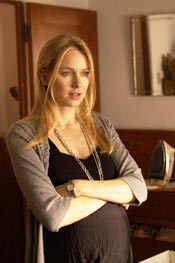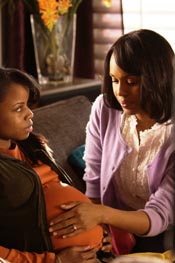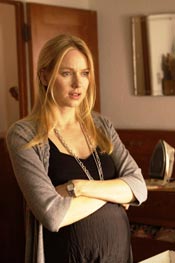Karen (Annette Bening) is a 51-year-old physical therapist who lives with and cares for her ill mother.When Karen was a pregnant teenager, her mother forced her to give up her baby for adoption; 37 years later, Karen’s obsession with the daughter she never knew has left her bitter and brittle.
Elizabeth (Naomi Watts) is a high achieving 37-year-old attorney who lives alone and prizes her independence above all else. Placed for adoption at birth, Elizabeth never bonded with her adoptive family and apparently never developed a capacity for healthy relationship; she eschews female friendship and seduces men for the control it gives her over them.
Lucy (Kerry Washington) has been trying for four years to conceive a child with her husband, Joseph. When all signs point to her unyielding infertility, she pours her passionate maternal ambition into pursuing adoption.
Mother and Child tells the mostly tragic but sometimes hopeful stories of Karen, Elizabeth, and Lucy, and explores the ways their lives are touched by adoption and motherhood. It is the latest work of writer/director Rodrigo Garcia (son of acclaimed Columbian novelist Gabriel García Márquez), who specializes in making the cinematic equivalents of short story anthologies about the lives of tragic women.

In his previous films (Things You Can Tell Just By Looking at Her, Ten Tiny Loves Stories, Nine Lives) Garcia tackled multiple storylines and only rarely allowed them to intertwine. In Mother and Child, he focuses chiefly on the lives of three women and draws stronger thematic and circumstantial connections between them, making this film arguably Garcia’s most commercially palatable work to date. (Alejandro González Iñárritu—a frequent Garcia collaborator and an executive producer of Mother and Child—has helped popularize films that explore interlocking storylines with movies like Babel and 21 Grams.) Sony Pictures Classics secured the film after its debut at the 2009 Toronto Film Festival provoked a considerable bidding war.
Still, Mother and Child should not be confused with typical Hollywood fare. It runs considerably darker and deeper than your average chick flick, with mixed results. Like the complicated and often contradictory people it aims to portray, Mother and Child is sometimes brilliant, sometimes ridiculous, and, too many times, just plain confusing.
Garcia undoubtedly has a knack for casting the right actors and creating the cinematic space for them to flourish. The cast in Mother and Child is uniformly strong, and several of the leads give career-defining performances. Bening is almost unrecognizable in the film’s first act; her eyes deadened by defensiveness and her mouth pursed in habitual hostility. Although the script sometimes asks her to do and especially say extreme and implausible things, somehow Bening imbues every frame she inhabits with authenticity and credibility. Watts is equally triumphant in her equally extreme role; her Elizabeth is often chilling in her need for control, and yet somehow there is enough pathos beneath the frosty exterior that the audience cares about her as much as they are frightened by her. Washington’s Lucy is the film’s most histrionic character, but the actress delivers a standout performance that balances strength and vulnerability in an immensely engaging way.

Although the men have considerably less to do in Garcia’s film, the male cast in Mother and Child is strong as well. Samuel L. Jackson is gracious and restrained as Paul, the accomplished widower Elizabeth seduces. Jimmy Smits is grounded and believably blue collar as Paco, Karen’s would-be suitor. And the film’s silent men—David Ramsey as Lucy’s ambivalent husband Joseph and Marc Blucas as a neighbor only too willing to be caught in Elizabeth’s web—manage to move their characters beyond caricature even when the script seems determine to leave them there.
But for all the truly brilliant acting in Mother and Child, its script very nearly chokes on its own self-important, deeply analytical obsessiveness. Garcia seems to find feminine misery intoxicating, and his assumption that the rest of the world shares his fixation asks a lot of the story and its audience. Karen, for example, is not just “difficult” (as she sometimes describes herself); she is abrasive, rude, hostile, erratic and irrational. And yet her new coworker Paco is inexplicably drawn to her. Elizabeth, similarly, is so dominant, controlling, and belittling in her first sexual encounter with her boss that it hard to imagine that any man (without a strong masochistic streak) would tolerate the humiliation, and yet Paul, a powerful, successful, seemingly grounded man, enters willingly into a relationship with her. And Ray (Shareeka Epps), the young pregnant woman who may or may not give Lucy and Joseph the baby they long for, is so ultra-edgy and hyperbolically self-possessed she threw me into a spasm of longing for a parallel but more relatable character like the title character in Juno.
The dialogue in Mother and Child is as erratic as the characterization. Sometimes, Garcia shows a breathtaking deftness for natural dialogue; people say (or don’t say) just the sorts of awkward, unrehearsed things they do in real life. A scene in which Paco finally loses his patience with Karen and calls her a “weirdo” goes down just like it would in any parking lot in North America. In another moment, Karen’s mother almost speaks and then turns away in a shattering instant that communicates volumes. But other times, Garcia seems to shift gears and asks his characters to deliver oddly articulate speeches, as in the rooftop exchanges between Elizabeth and a blind teenager who comes late to the film and seems to be little more than a philosophical device.

Garcia’s handling of his Big Themes—which include adoption, motherhood, and, interestingly, faith or the lack thereof—is, like his dialogue and characterization, sometimes adroit and sometimes heavy handed. To his credit, he lets opposing and conflicting ideas stand, and allows for the possibility of multiple interpretations. People of faith (a gentle nun who guides adoption proceedings, Paco’s devout Catholic daughter) and people of disbelief (Lucy and Paco both declare there is no God) are given equal time and credibility. The film does not force a resolution, which may be frustrating to those on either side of the debate, but mirrors real life rather well.
Some adoption advocates may chaff at all the misery chalked up to prior adoptions (Elizabeth seems to not even remember she had an adoptive family), but in fairness Garcia portrays biological motherhood through an equally dark lens. In the final analysis, it’s that lens—and the way it plunges sexuality, motherhood, and everyday life into hyperbolic despair—that keeps Mother and Child from being a masterpiece. As it is, the film (which does manage to engage for its whole 125 minutes) is an intriguing composite of some very fine, even extraordinary, parts. It’s just a shame that they don’t quite add up to the whole they could or should have been.
Talk About It
Discussion starters- Although her perspective eventually changes, at one point Lucy claims adoption is “not natural.” What do you think about that statement? Have you (or someone you know) had an experience with adoption? Do you agree or disagree with the idea that “time” counts more than “blood”?
- Lucy says something like, “We come from nothing, and when we die we go to nothing, and what happens in between has to do with our character and luck.” What do you make of that perspective? What roles do you think our characters and our wills play in how our lives go? Does “luck” play a role at all?
- Karen longed to hear affirmation, tenderness, empathy or apology from her mother. Is there anyone in your life who is waiting to hear a particular word from you? Can you speak it or write it to them?
- Lucy is surprised by how difficult it is to care for a newborn. Have you been through that experience? If so, what did it teach you about selfishness and sacrifice?
The Family Corner
Mother and Child is rated R for sexuality, brief nudity, and language. There’s liberal use of strong and profane language, and several sexual situations are portrayed somewhat explicitly. There is (brief) full frontal nudity. Although the film offers some truly redemptive aspects and some interesting themes, it earns its R rating and viewer discretion is strongly advised.
Photos © Sony Pictures Classics
Copyright © 2010 Christianity Today. Click for reprint information.











